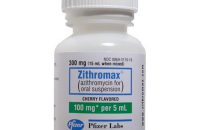Antibiotics: Safe or Dangerous?
Nowadays opinions on antibiotics were seriously reconsidered. When a patient caught a cold there is no point in using antibiotics, besides it sometimes may be harmful. A cold is an acute respiratory viral infection (ARVI), and antibiotics do not fight with viruses. They are useless in treating the flu, measles, rubella, chickenpox, mumps, hepatitis A, B, C, and many other diseases caused by viruses.
Antibiotics do not work well with fungi, worms. Some serious virulent disease is caused by bacterial toxins, so, first of all, they should be treated with antitoxic serum. Botulism and tetanus are related to such dangerous diseases. Many chronic diseases, with microorganisms playing an important role, are treated with antibiotics only in exacerbation period. Such diseases include, for example, pyelonephritis and chronic bronchitis.
There also are diseases that can’t be cured with antibiotics only. Only several antimicrobial agents combined are capable of treating the Koch’s bacillus. That is why it is so important not to take antibiotics on your own decision or advised by a friend without doctor’s prescription.
Complications of viral infections
As acknowledged antibiotics are prescribed for prevention and treatment of viral infections and their complications. Bacterial diseases pathogens are often our own microorganisms that live permanently in our mouth and epipharynx. They quite peacefully co-exist with our body. Their reproduction is limited to cells of the immune system. “Our” microorganisms give us good service: they do not give other microorganisms to multiply and cause negative effects. Sometimes viruses can break defense mechanism. In this case, the “peaceful coexistence” is disturbed and a viral-bacterial disease develops. But if we begin to take antibiotics, we unwillingly destroy our “native” bacteria. Our respiratory tract is immediately filled with the “foreign” pathogens and the immune system requires time to build a defense mechanism against them. Besides, new pathogens can be resistant to many antibiotics. This means that for infection treatment caused by this microorganism the next generation antibiotics are required. My Canadian Pharmacy has all the latest generations of antibiotics, such as Zithromax and Amoxicillin, online available at any time.
A few serious recent studies proved that antibiotics prescribed for preventive purposes are useless for bacterial exacerbation at ARVI. Furthermore, people who didn’t treat bacterial infections with antibiotics before recover quickly. And those who took antibiotics earlier, treat infections for a long time. That doesn’t mean that antibiotics are dangerous, but they are not completely harmless. Not only because they affect our immune system. Many people’s reaction to penicillin and other antimicrobial agents appears as a rash, allergic edema, and even shock. 
Very often allergic reactions appear if an antibiotic is given to the patient who doesn’t suffer from a bacterial disease. Gentamicin can cause deafness and kidney damage; kidneys may also be affected by some cephalosporin. Tetracycline, doxycycline bear toxic influence on the liver. Fluoroquinolone group medications increase light sensitiveness and affect the cartilaginous tissue. Children are prescribed to take them only in extreme cases, while they may interfere with growth. Laevomycetin can cause severe blood, liver and nervous system damage. Almost all antibiotics cause the normal balance of intestinal microorganism disorder – dysbacteriosis. This list of side effects can be continued.
Nevertheless, this complications can be avoided even if antibiotics are still needed to be taken. If a person has had an allergic reaction to an antibiotic, it is necessary to inform the doctor. Accurate information will help your doctor choose the right replacement for the antibiotic.
Using antibiotics without prescription
Self-treatment with antibiotics is fraught with consequences. Only a doctor knows how to choose a drug. Pathogens even a very similar from the clinical picture of the disease may be very different. Bacteria have a sensitivity and resistance to different antibiotics.
But even if the pathogen and its sensitivity are known, it is necessary to choose a drug that reaches the localization of the microbe in the body. Dosage depends on the age and comorbidities of the patient. The same antibiotic cannot work even if it deals with exactly the same disease at the same person. The reason is that bacteria quickly adapts to the antibiotic, and the next administration of it may have no effect.
Antibiotics are necessary for treating bacterial infections. A disease usually caused by bacteria is called pneumonia. In its course the body temperature does not go down on, t holding above 38 degrees C for three days or more. Shortness of breath and chest pain may be observed.
Antimicrobial agents’ prescription is necessary in case of such acute infections as:
- pyelonephritis;
- erysipelatous abscesses;
- osteomyelitis.
All the necessary drugs can be found online together with the qualified assistance.
Antibiotics must be used if we are talking about the life and death of the patient. There is a number of chronic diseases that can be cured only with antimicrobial agent. These are such diseases as mycoplasmal infection, chlamydia, and other sexually transmissible diseases.







